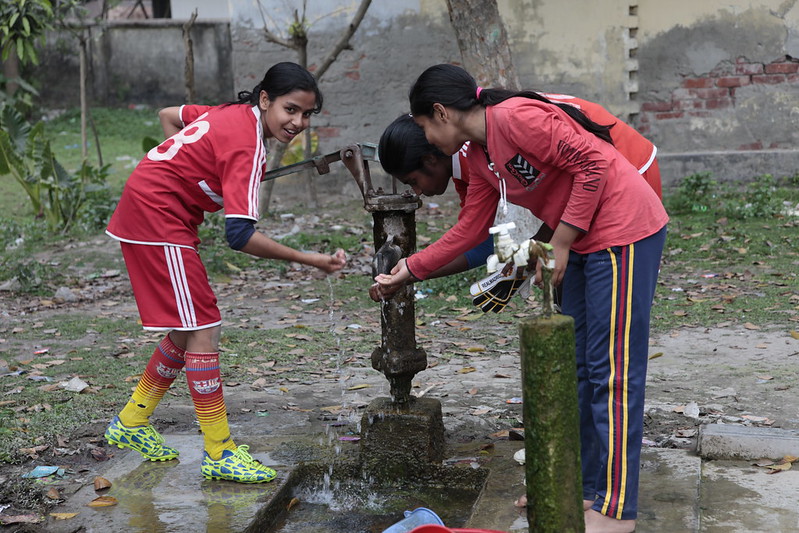Early marriage remains a pervasive issue in developing countries, with an estimated 650 million women globally married before the age of 18. This is a particular challenge in South Asia, where the prevalence of child marriage is significantly higher than in other parts of the world, with one third of women between the ages of 20 and 24 married before the age of 18. Bangladesh, in turn, has the highest rate of child marriage in South Asia—59%—and the fourth-highest prevalence of child marriage in the world, with 22% married before the age of 15 (UNFPA 2019).
Numerous studies have shown the negative effects of early marriage on education, employment, health, and exposure to domestic violence for young brides. Yet limited empirical evidence exists on its impact on women’s decision-making within marriage. This is a crucial issue: The timing of marriage is a critical decision that can significantly influence women’s agency and decision-making capabilities within the household.
In a new paper in The World Bank Economic Review, we explore the impacts of early marriage in Bangladesh, examining how the age at which women marry affects their standing in the husband’s family, subsequently influencing their empowerment in the spousal household in both the domestic and productive spheres—finding negative impacts of early marriage across a range of measures.
The relationship
By isolating the causal effect of early marriage on young brides in rural Bangladesh, the research aimed to unveil the true extent of its impact on women’s agency and decision-making. These factors interact in complex ways. Gender inequality is closely tied to women’s low bargaining power in household decision-making. Meanwhile, the literature emphasizes the multifaceted impact of women’s agency on overall household well-being, including diet diversity, nutrition, infant and young child feeding practices, and poverty alleviation.
We used data collected from 5,433 ever-married women in the third round of IFPRI’s Bangladesh Integrated Household Survey (BIHS) conducted across the country’s rural areas in 2019. The survey administered separate modules of questions to calculate various indicators of women’s status, and modules to estimate the Women’s Empowerment in Agriculture Index (WEAI). We examined the impact of delayed marriages of women on measures of women’s agency in both the productive sphere (WEAI), and the domestic sphere (indicators of freedom of mobility, control over income, etc.), and explored the channels mediating this impact, including education, employment, and assets brought to the spousal household.
The endogenous nature of the age at which parents marry their daughters in Bangladesh presents econometric challenges, including omitted variables bias and potential reverse causality. Building on the work of Field and Ambrus (2008), the study addresses these concerns by employing an instrumental variable strategy, using age at menarche as a quasi-random variation in the age at which girls are married.
Empirical findings
The research reveals compelling evidence that delaying marriage positively influences a woman’s bargaining strength, in both productive and domestic spheres, in her spousal household. A one-year delay in marriage causes an increase of 3.9 percentage points (or 0.27 standard deviations) in the weighted empowerment score, and a 6.7 percentage point increase in the probability of achieving empowerment status. Moreover, delaying marriage positively influences women’s autonomy in household production, ownership of assets, control over household income, and public speaking abilities.
In the domestic sphere, positive and significant outcomes include increased freedom of mobility (0.24 standard deviations increase in mobility index), control over income generated outside the home (6.8 percentage points), and the ability to make independent decisions regarding household expenses and investments (0.16 standard deviations increase in decision index) as a result of delayed marriage.
Our analysis explores potential mechanisms driving these impacts, linking delayed marriage to increased likelihoods of women completing primary education (5.3 percentage points), working for pay (5.8 percentage points), and bringing assets to the marriage (6.8 percentage points). The robustness of our results is confirmed through various tests.
Implications and recommendations
For policymakers and stakeholders, these results suggest that addressing the deep-rooted issue of early marriage can yield a variety of social and economic benefits. In particular, establishing a legal minimum marriage age and enforcing it strictly is key to women’s agency and broader social welfare.
While Bangladesh has established a minimum marriage age of 18 for girls, weak enforcement and provisions that permit child marriage in “special cases” are ongoing problems. To effectively prevent child marriages, legal measures alone are not sufficient; they should be complemented by initiatives that incentivize parents to delay their daughters’ marriages. Programs like the Bangladesh Female Secondary School Stipend Program (FSSSP)—which offers financial support to families to keep their daughters attending high school—have shown promising results in improving women’s education and well-being. However, there is a need for more inclusive programs that support families with unmarried girls, even those not attending school, to ensure broader compliance with marriage laws and encourage delayed marriages.
Conclusion
These findings underscore the multifaceted impact of marriage timing on women’s agency in rural Bangladesh, and strongly suggest that programs focused on delaying marriage—above and beyond legal requirements—can have broad positive impacts. Empowering women through education, financial support, and community-based initiatives can create a positive ripple effect, benefiting not only individual women but also their families and communities at large.
Salauddin Tauseef is an Associate Research Fellow with IFPRI’s Development Strategies and Governance Unit, based in Vientiane, Lao PDR; Farha Deba Sufian is an IFPRI consultant on gender issues. Cited research is peer-reviewed.
Referenced paper:
Salauddin Tauseef, Farha Deba Sufian, The Causal Effect of Early Marriage on Women’s Bargaining Power: Evidence from Bangladesh, The World Bank Economic Review, 2024; lhad046, https://doi.org/10.1093/wber/lhad046







